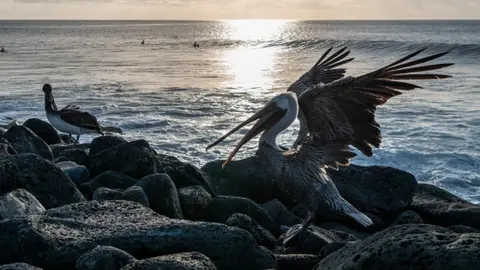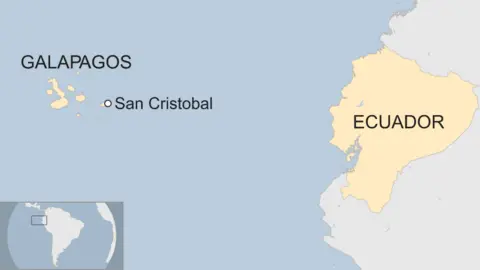Ecuador 'allows US military planes to use Galapagos island airfield'
 Getty Images
Getty ImagesEcuador has agreed to allow US military planes to operate from an airport on the Galapagos Islands, reports say.
US aircraft will be able to use San Cristobal airport, Ecuador's defence minister Oswaldo Jarrin has been quoted as saying.
They will "fight drug trafficking" under a deal with Ecuador's government, Mr Jarrin said.
The reported deal has prompted concerns over the potential impact on the environment and Ecuador's sovereignty.
The aircraft involved include a Boeing 777 and a Lockheed P-3 Orion, Latin American TV network Telesur reports.
The Galapagos Islands, 563 miles (906km) west of continental Ecuador, are a Unesco World Heritage site renowned worldwide for their unique array of plants and wildlife.
 Getty Images
Getty ImagesTourists across the globe travel there to see its biodiversity, which inspired Charles Darwin's theory of evolution.
Legislators in Ecuador's parliament have called on Mr Jarrin and environment minister Marcelo Mata to explain the scope of co-operation with the US in the islands.
They have asked them to elaborate on proposals to extend the runway at San Cristobal airport, daily El Universo reports.
Lawmaker Marcela Cevallos said the plan would be alarming for conservationists, it reported.
Opposition congressman Carlos Viteri said the agreement with the US was "unacceptable" and should be prohibited if "it intends to cede an inch of Ecuadorian territory".
Under Article 5 of Ecuador's constitution, the country is "a territory of peace" and the "establishment of foreign military bases or foreign facilities for military purposes shall not be allowed".
Ecuador's former president Rafael Correa also reacted angrily, tweeting (in Spanish) that the island was "not an aircraft carrier" for the Americans.
Mr Jarrin assured critics that "there will be no permanence of anyone" on the island.
He said any modifications to the airfield would be paid for by the US, Telesur reported.
"Galapagos is for Ecuador our aircraft carrier, it is our natural carrier, because it assures us permanence, replenishment, interception facilities and it is 1,000 kilometres from our coasts," he said.
The BBC has contacted the US Department of Defense for comment.

